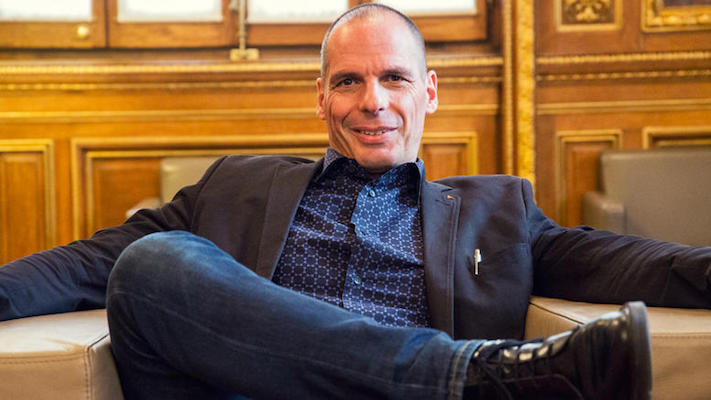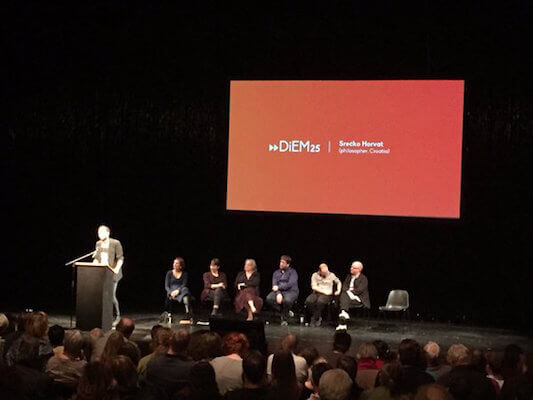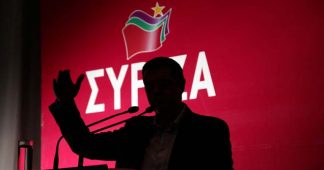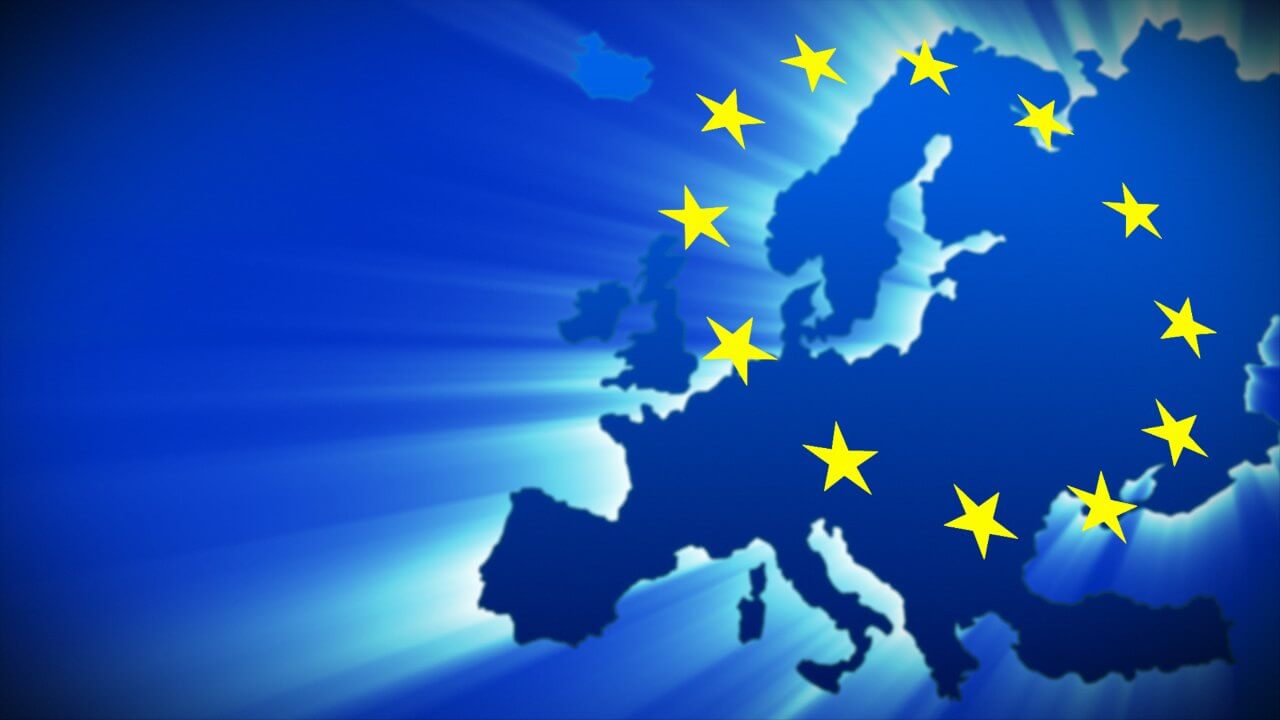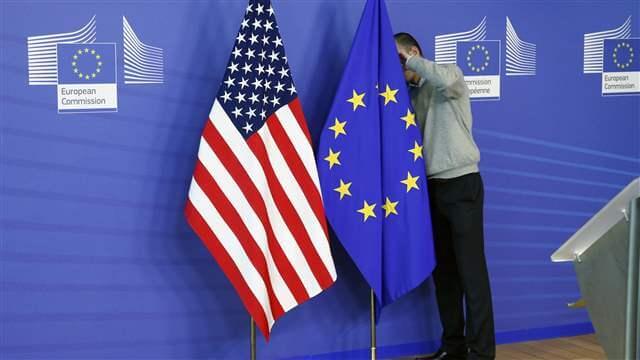Yanis Varoufakis speaks to DiEM25 Aegina, 22nd July 2016
https://www.youtube.com/watch?v=VyNfj52AVKw
Question: What does DiEM 25 mean?
YV: I’ll tell you. For a start we were looking for a name that would have universal application. Not to be meaningful only in England or France, or only in Greece. And we started with some Greek words, roots of Greek words.
We had difficulty finding a Greek word that would both be original and….. we found one that I liked a lot. I personally liked it. Not many others liked it. It was Eudora. It meant: “European Union – democratize or abolish!” I really liked it, until colleagues from Germany said: “Forget it!” Because Eudora is a very cheap brand of refrigerator in Germany.
So that was the end of that. And then I thought of DiEM from “carpe diem ”. I liked “Democracy in Europe Movement”. And then Julian Assange said: “We have to put a number.” Like Prague 77. We said that to give a sense that democracy in Europe is not a luxury that will come at some point. It either happens now or there is an end to that thing called the European Union. So we wanted to say: “What is the time limit we give ourselves: until 2025.” And that’s too long. Yes, it’s like science fiction. But if we make it 2018? Ten years is a good figure. Perhaps in 2024 we’ll change it.
I think that the period from 9th February when we started in Berlin, until today has been particularly satisfactory. It could have been better. It would be good to have a stronger presence in all of Europe. As you may know, we have twenty seven groups in Finland. We are present in Slovakia. In Germany we have 1,700 groups like this one here. From between ten and a hundred people. That’s not a small number, 1,700 groups. They formed spontaneously. We didn’t go to start them. They started on their own.
Our collaboration with political parties, or parts of political parties: We aren’t a federation of parties. For example, with the SPD, we collaborate with some in the SPD. The others in the SPD don’t want to have anything to do with us. In Die Linke in Germany there is a split between the Lafontaine group – who are in favour of dismantling Europe. We have very good relations of collaboration with them. We can work together – and the group of Katja Kipping and Gregor Gysi who are Europeanists. The same applies with with PODEMOS. Half of PODEMOS want to leave the Eurozone, and Europe. The other half is with us.
We have a fraternal relationship, a relationship of everyday work with the municipalities of Barcelona, Valencia, La Coruna and Madrid in Spain.
For a year and a half, wherever I find myself, I have been talking about the great dichotomy. We have functioning democracies in the framework of the member states. In Italy, in Greece, we have a constitution. We have a constitutional process. At the same time we have a continual shift of the centre of decision-making from democratic and constitutionally functional member states to the European centre, to the European institutions which are designed not to be democratic. I insist on that working hypothesis. We don’t have a democratic deficit. There hasn’t been an accident. It isn’t that we weren’t careful. They were designed to operate anti-democratically. Not just undemocratically. That was my experience at any rate.
Do you remember the first name of the European Union?
Audience member: The EEC.
YV: No. The first. The European Community for Coal and Steel. It was a cartel, like OPEC, the Organization of Petroleum-Exporting Countries. They created a cartel which basically regulates profits by controlling prices. That’s the way the European Community was created. The aim was to stabilize the profits of heavy industry in the region between Germany, France, Northern Italy, Belgium and Holland. That’s what it was all about then. So that there wouldn’t be competition between the heavy industry of those countries.
When you construct a cartel for heavy industry and then adapt it the big farmers of France and Germany – that was the Common Agricultural Policy – essentially what happens? – to buy the toleration of the farmers they took a part of the superprofits of heavy industry and gave it to the farmers. That’s what they did. To buy the toleration of the French farmers, primarily, who controlled the National Assembly in Paris, as always in France, even today if the farmers want to close the roads that’s the end of the French government, even today, despite the fact that today they don’t have any power comparable to what they had in the fifties.
When you put a bureaucracy in Brussels whose aim is to administer that cartel, that is not a state. Not even a state under construction. Not even an institution that will develop automatically into a state. The German state, the British, the American, even the Greek, was created in a very different way. It was an evolving institutional entity whose aim was to regulate the social conflicts, initially, between the landowners andthe palace. And then the landowners, he palace and the bourgeoisie, and between all those and the working class and the trade unions, and various social… That’s the way that states are created, which are then democratized because it is only through the legitimation provided through such a state entity that social conflicts can be regulated. Particularly in periods of crisis. The bureaucracy on its own cannot evolve.
Audience member: But hasn’t it been democratized in a way through Erasmus?
YV: Erasmus is very interesting and very positive but it doesn’t have any connection with the way decisions are made. Erasmus is fantastic. I think it’s great that young people can go for six months… Erasmus has no connection with democracy. Democracy has to do with who makes decisions. Erasmus isn’t that. Erasmus is a very fine programme. Do you know something? The Soviet Union had very fine programmes. But it wasn’t a democracy.
Audience member: Yani how do you see the contribution of Spinelli, Altiero Spinelli? Many federalists believe that he played a role in the democratization of the European Union.
YV: He failed. If only he had succeeded. Spinelli essentially said what we are saying today. But unfortunately he did not succeed. It wasn’t the Spinelli model that was adopted. It was the Monnet model. And Monnet was deeply anti-democratic. Monnet wrote entire texts against democracy. And he spoke openly: he said the European Union must prevent the democratic process from spoiling the way the EU operates. He didn’t try to hide it.
Audience member: And Jacques Delors?
YV: Jacques Delors was thirty years later. Jacques Delors had his own approach. He had accepted the mode of operation of the European Union. But let’s not forget that Delors came to prominence as Mitterand’s finance minister, who did the same backflip as us. What we did in July 2015 Delors and Miterrand did in 1983. They had been elected to put an end to the austerity of Giscard d’Estaing previously, and specifically of Balladur, who had been minister. After two or three years they did the exact opposite. They implemented the very harsh austerity for one purpose. Delors had one purpose: to persuade the Germans to proceed with federation. Because he regarded that as his political obligation. The only way to counter austerity was for Paris to impose itself on the Bundesbank, the German Central Bank. And the only way that could be done was for the franc to be locked together with the mark, for there to be a Central Bank, for the French essentially to acquire control of it. But for the Bundesbank to be persuaded to lock the exchange rates of the franc and the mark they would have to introduce harsh austerity. So the only way to stop austerity was to introduce harsh austerity. Have you ever seen anything like that? Does it remind you of something?
The “Aqua Loca” function, 11th August https://diem25aegina.wordpress.com/2016/08/15/sinandisi-meeting-diem25-11-8-2016/ (Scroll down for English)
Address by Dina Hatzina:
“DIEM 25 Aegina” is an initiative of those residents of the island who are interested in participating, and uniting our efforts, with the pan-European movement “DIEM 25”, which means “Democracy in Europe Movement 2025”, which has 23,000 members in 56 countries.
Following this movement, and not party, as some mistakenly believe, which was launched on 9th February 2016 in Berlin (inside the “belly of the beast”) by Greece’s former Minister of Finance Yanis Varoufakis as you already know, which is now sweeping all of Europe, we are now participating also. The Aegina group was established on 4th May, entirely spontaneously, and has already held two successful public functions.
Today we feel particularly honoured and pleased to be here with Mr. Varoufakis and the DIEM 25 representatives from other European countries at today’s meeting and discussion, and with all of you who have honoured us with your presence. We emphasize that it is the first meeting and discussion to be held in Greece in the presence of the inspirer of our movement and of one of the Spontaneous Collectives for the Democratization of Europe (DSCs), as the local groups throughout Europe are called. So Aegina has scored this first also.
If we take into account that this was the first capital of the modern Greek state, with Ioannis Capodistrias, who made Aegina the epicenter of his political, economic, administrative and educational activity and succeeded in just 45 months of government in achieving the rebirth of a nation, despite the obstacles, as his policies came under fire from within Greece and outside Greece, as we all know, then the symbolism is powerful.
Having become aware of the situation that prevails in the country as we go into the seventh year of economic crisis, and having suffered from the austerity measures that have been imposed on us by those in government as well as from terrorization by the INF and the Eurogroup, we participate in “DIEM 25 Aegina” and demand full transparency.
We demand full transparency in decision making (live transmission of the meetings of the European Council, the Eurogroup, Ecofin, posting on internet of all the documents related to trade agreements such as TTIP and TISA, reform of the policies of the EU’s existing institutions).
Our little island endorses the demand for transparency. The voice of our citizens was heard again on 4th July when, to the credit of its president Nikolaos Oikonomou, the Municipal Council agreed that Aegina should join the network of cities free from the TTIP and CETA agreements. The contribution of Wayne Hall was valuable in getting this process under way.
So Aegina is now the 24th municipality of Greece to declare itself symbolically free from these agreements which if they are ratified will be able to abolish the valuable classification of products as Protected Designation of Origin, damaging Aegina’s pistachio production. They also have the potential to degrade the protection of health and the environment, because many regulations will be judged to be impediments to globalized trade.
Transparency is one of the three elements that will lead to democratization of the mechanisms for decision making, as Mr. Varoufakis pointed out in his most recent interview in the Avghi newspaper. It will put an end to recessionary policies.
We prioritize objective information provision, monitoring journalistic platforms such as the Press Project and 1101 on the internet, and not only them. We inform ourselves on issues of work, health, social policy, the economy and anything else that is of concern to the citizen of Europe. Documented information, with arguments, keeping its distance from manipulation and propaganda.
Aegina is a dynamic participant in the movement for transparency and democracy.
Carpe DIEM 25.
Address by Judith Meyer:
Good evening!
My name is Judith Meyer. I am German, I don’t have Greek origins, so my Greek is horrible, but I’ll try to speak to you in Greek.
Why am I here with DiEM25? The story begins in January or maybe February 2015.
The Greek negotiations entered public consciousness. Until then, the average German wasn’t talking much about Greece, about the MoUs and so on. There was a general sense that the South doesn’t understand economics and regularly needs German money, but people in Germany couldn’t have told you how many MoUs had been signed or what their terms were. Yanis Varoufakis changed that.
He did not just represent the Greek people strongly in the negotiations, but also showed other Europeans what was happening. What was happening at the Eurogroup, what was happening with Greece, what are the other European governments doing, who, behind closed doors, often exceed their popular mandate.
Of course German newspapers didn’t write this. At that time, some of us woke up because there was no longer diversity in German newspapers on this topic, ALL were writing that Greeks are lazy, that the new Greek government was ignorant and dangerous, that Finance Minister Varoufakis was the worst, the enemy of German taxpayers. When all newspapers write the same, that’s a warning signal: it’s crucial to find other opinions too.
When you look for the truth on that time period, it’s easy to find.
- Greeks aren’t lazy – on average they work 700 hours more than Germans every year.
- The new Greek government wasn’t ignorant or dangerous – its proposals had the support of well-known economists.
- Varoufakis wasn’t the enemy of German taxpayers – he wanted us not to pay billions of Euros if there is no chance of economic recovery in Greece, and the following year we’d have to pay even more.
Unfortunately the majority of my compatriots did not look for this information and only listened to the media who spoke of BATTLE between you and us. That was the means that the German media used so that there would be no solidarity between the poor people in Germany and Greece. Our media spoke of germanophobia in Greece, they showed photographs of Greek demonstrations where people had Merkel with Nazi emblems… that hurts, but… if the people don’t work together, only bankers will win.
To be honest, even we who did not support the German government didn’t know how harsh our politicians could be to Greece. In May, June, I was writing articles to explain the Greek positions to my compatriots and to English speakers, but I still didn’t believe my Greek friends who were afraid of becoming a debt colony. I didn’t believe them. I apologised to them on the 13th of July.
I think that outside of Greece, not many expected it, because we’re Europeanists. We didn’t want to believe it. It was a terrible wake-up call for those who saw it (which wasn’t all in Germany, because many German media reported about the 12th of July as about just any other night of negotiations, they didn’t speak of victory or the like).
For me, my European dream had been demolished. In my depression, I wrote an email to Mr Varoufakis on July 14, in order to thank him for having shown us the true face of the European Union.
He didn’t know me, so I didn’t expect a reply, but it came: “Thanks Judith. We need to remain pro-European and criticise actively those who have usurped Europe.”
Thus we started to exchange emails. In November he wrote to me about DiEM25, the manifesto and so on.As a European movement, DiEM needed a multilingual web presence, and since I speak 13 languages, the first task I undertook was the organisation of multilingual Twitter accounts and the translation of the website by volunteers.
Nowadays I organise everything to do with DiEM25 volunteers. We have so many! More than 20,000 Europeans want to do volunteer work for DiEM25.
The Athens Spring and the 12th of July were a necessary shock. Now my generation, the Erasmus generation and the generation of open borders, has woken up. We won’t allow the leaders of the European Union to destroy our European dreams. We demand a democratic Europe with transparency, shared prosperity and a sense of ethics.
Europe will either be democratised or it will disintegrate!
